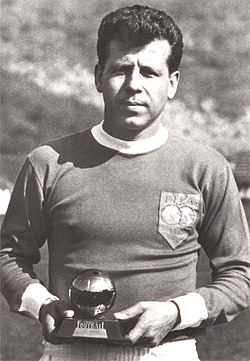| 1962 Ballon d'Or | |
|---|---|
 1962 Ballon d'Or winner Josef Masopust | |
| Date | 18 December 1962 |
| Location | Paris, France |
| Presented by | France Football |
| Highlights | |
| Won by | |
| Website | francefootball.fr/ballon-d-or |
The 1962 Ballon d'Or, given to the best football player in Europe as judged by a panel of sports journalists from UEFA member countries, was awarded to Josef Masopust on 18 December 1962. [1]